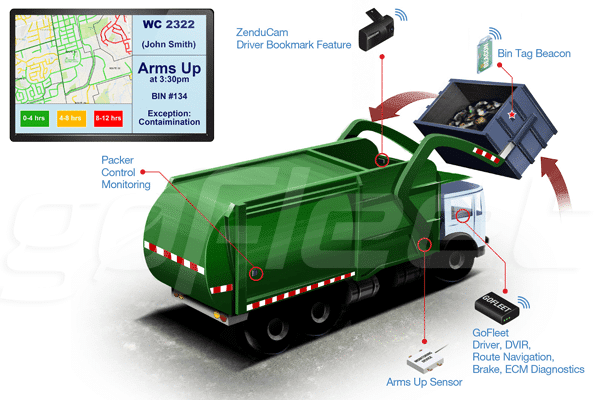Waste Management Solutions Optimize Routes & Increase Safety
Waste Management is an area that is ripe for improvement through telematics. Garbage trucks run similar routes day after day, and any time that can be shaved off the route is saving the company money. It’s not like a bus route that must keep to a schedule. We offer a comprehensive telematics package that can drastically improve your waste management operations.
A Complete System
Our Waste Management Solutions offer several components that when combined, provide the biggest benefits. The heart of our waste management solutions is our GO7 device, the most popular telematics device in the world. It fits in the palm of your hand and easily connects to most vehicles, allowing it to collect GPS data plus information from the engine and other onboard sensors. This data is all relayed back to fleet managers through a variety of methods and with the latest encryption technology.
Another key piece of technology is a packer control monitoring sensor. This device automatically tracks how full a vehicle’s storage is, allowing a fleet manager to adjust plans as necessary. Next comes ZenduCam, with a driver bookmark feature that provides a view into the receptacle of the truck. Finally, complete waste management systems incorporate “arms up” sensors to record whenever a load is lifted and bin tag beacons to keep track of each deployed bin.
Data For Managers and Customers
These devices allow fleet managers to scrutinize the time spent in each step of the process. This includes visibility into how long each stop takes. Fleet managers may notice that certain stops take a long time to complete and they may need to take steps to improve accessibility to trash receptacles at those sites. Power take off diagnostics allow fleet managers to see the frequency and duration of each waste bin lift. Data can also be provided back to customers. Most notably, our comprehensive waste management solutions allow fleet managers to provide verifiable proof of service to their customers. The packer control monitor also provides some visibility into how much waste is coming from a particular route or location.
Limitless Additional Features
If you choose our waste management solutions, you also have the option to add numerous additional features. For example, we can pair your system with fuel card integration that tracks how much fuel is going into the vehicle. Fuel transactions can be compared with other data such as route planning and idle times to minimize fuel costs. We have a comprehensive route dispatching system that is delivered via one of the latest Garmin GPS systems. These can provide turn-by-turn assistance, hours of service tracking, and personalized messages to drivers. Our systems can also monitor and improve driver safety with long-term driver reports that can be used to reward good drivers and redirect those that need improvement. Our GO7 device provides immediate, in-vehicle feedback to drivers. For example, drivers can be given an audible warning for speeding, revving the engine, swerving, cornering, harsh braking, and much more.
